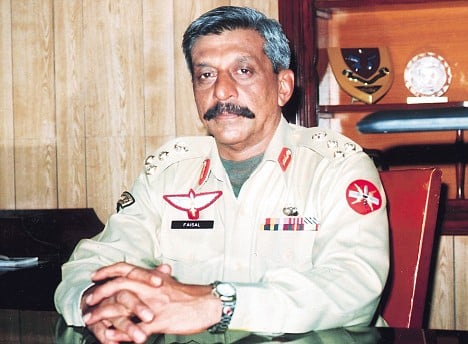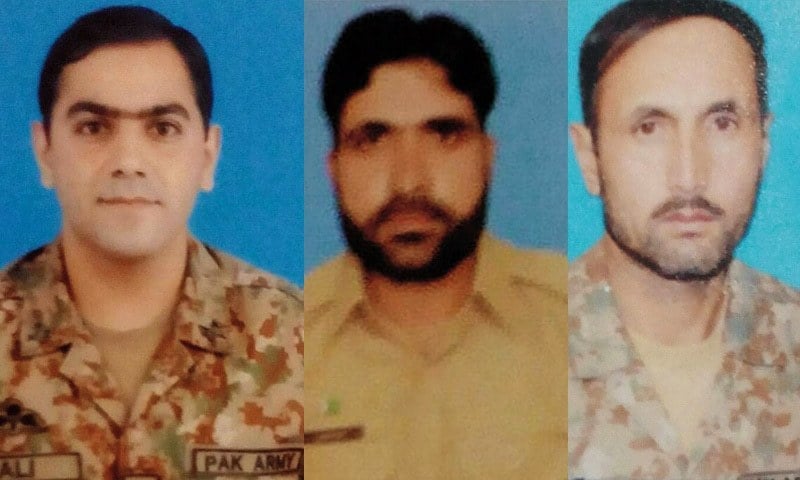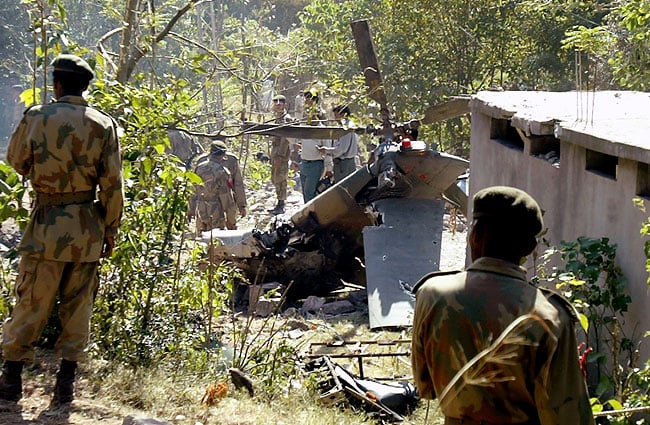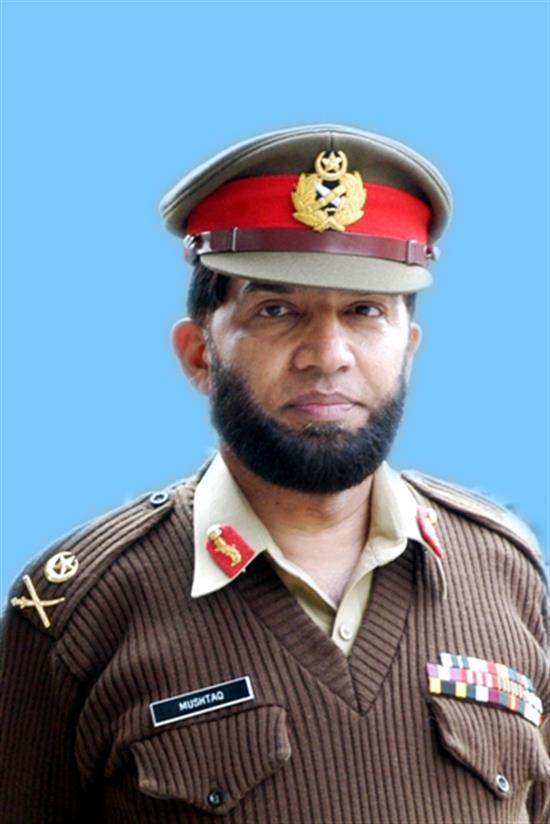Col Amir latest addition to Pak Army martyrs’ list
LAHORE: Laid to rest in Lahore Tuesday, Lt Col Amir is the latest addition to Pakistan Army’s illustrious list of martyrs who have laid their precious lives in the line of duty, leaving behind toddlers and school-going kids, young widows, ageing parents and tearful siblings to mourn their untimely demises till their last breaths.
Since the September 11, 2001 attacks on the United States and the world super power’s retaliatory “War against Terror,” thousands of Pakistani military personnel — ranging from brilliant high-ranking officers to gallant soldiers on the frontline — have lost lives defending their homeland, which has also borne economic losses between $ 107 billion and $120 billion till date.
(References: Former Director General ISPR General Asim Bajwa’s 2016 Press conference and a report prepared by the State Bank of Pakistan not long ago).
A few highly-acclaimed Pakistan military officials like Major General Ameer Faisal Alavi were even targeted by terrorists after their retirement.
On November 19, 2008, the Kenya-born General Faisal Alavi, a former head of the the Special Service Group (SSG), was gunned down near Islamabad.

Major General Ameer Faisal Alavi
He had commanded the SSG during the first major assault on militants in South Waziristan in 2004, and thus had to bear the brunt of devastating the terrorist hideouts.
Quite recently, on August 9, 2017, four Pakistani Army soldiers including Major Ali Salman were martyred during a military operation in Upper Dir area. The funeral of Major Ali Salman was also held in Lahore.

(L-R) Maj Ali Salman, Havaldar Akhtar and Havaldar Ghulam Nazir who were martyred during the counter-terror operation.-ISPR
Here follows a brief list of some of the finest Pakistan Army officials who have died while in action, and clad in uniforms, during the last one decade or so: In October 2007, an Army helicopter had crashed near Muzaffarabad during an emergency landing after having developed a technical fault.
Four persons including Brigadier Zahoor were killed in the incident. The then Pakistani President General Musharraf’s spokesman, Major General (Retired) Rashid Qureshi, was among those wounded.

The wreckage of a military helicopter that crashed as its pilot tried to make an emergency landing
The ill-fated helicopter was escorting President Musharraf to a ceremony staged on the second anniversary of the devastating October 8, 2005 earthquake in Azad Kashmir. On February 7, 2008, the Mianwali-born Major General Javed Sultan was killed in South Waziristan along with seven other Army officers when his helicopter crashed while returning to Kohat from Wana.
General Javed Sultan was General Officer Commanding (GOC) Kohat and was leading the troops fighting the Taliban militants in the then troubled Waziristan. A number of army officers, including two brigadiers, were also killed in the crash.
General Javed Sultan had served as the Defence Attache at the Pakistan High Commission in New Delhi before he returned to Pakistan, earned promotion to the rank of major general and was later posted to Kohat, where he had served for around a year until his death.

Besides Major General Sultan, the deceased were identified as Brigadier Afzal Cheema, Brigadier Saeed Khan, Lt-Colonel Omar Farooq, Captain Shehzad, Captain Naveed (pilot), Captain Haroon (pilot) and a non-commissioned officer Naik Amir.
Days later on February 25, 2008, Lt General Mushtaq Ahmad Baig, the Surgeon General of Pakistan Army, was martyred near the GPO Chowk in Rawalpindi Saddar. A suicide bomber had struck his vehicle at the busy intersection to kill him and 10 other people.

Lt General Mushtaq Ahmad Baig
On May 27, 2009, suicide bombers had detonated a vehicle loaded with 100 kilograms of explosives near offices of the capital city police officer and the Inter-Services Intelligence at Queen’s Road Lahore, killing a serving Army colonel.
The dead ISI officer was identified as Colonel Amir. Overall, at least 30 people were killed and 326 were wounded in this tragic incident. On October 10 and 11, 2009, nine soldiers, nine militants and two civilians were killed on GHQ in Rawalpindi, in what was visibly a major escalation in Pakistan’s domestic insurgency.
Soon after the attack, the militant infiltrated the security buildings where 22 civilian and military officials were held hostage by the militants. The Army dead had included serving brigadier Anwarul Haq and Lieutenant Colonel, Waseem Ahmd. On October 22, 2009, a serving Army brigadier, Moinuddin Ahmad, and his driver were gunned down in Islamabad.
Two motorcyclists had intercepted the brigadier’s official jeep and sprayed bullets on it. On October 27, 2009, another military officer, Brigadier Waqar Ahmad, was killed in Islamabad. Two gunmen riding a motorbike had attacked the brigadier, who was travelling with his mother and driver.
On December 4, 2009, Major General Bilal Omar Khan, the director general of the Pakistan Army’s Armoured Corps at the time, was among those martyred in the terrorist attack on the Parade Lane mosque in Rawalpindi Cantonment.
Evidence suggested that Major General Bilal Omar had left the mosque for home after offering his prayers, but had returned after hearing the blasts and the firing that ensued. He reportedly grappled with one of the suicide bombers and broke his ribs, before the bomber actually blew himself up, killing the General on the spot.
Apart from General Bilal Omar, a brigadier, two lieutenant colonels and two majors were also killed, while Deputy Director of the National Logistics Cell, Taskeen Anjum and Hashim Masood Aslam ( the only son of the then Commander XI Corps Lt. General Masood Aslam) had also perished.
Meanwhile, General Yusuf Khan, former Vice Army Chief, was injured in this attack. Overall, some 40 people, including children of Army personnel, were killed instantly in this attack, while 80 others were injured.
The victims were mostly retired and serving Army officers. On May 22, 2011, Lieutenant Syed Yasser Abbas had displayed exemplary gallantry while fighting against armed militants during the PNS Mehran Attack.
Syed Yasser Abbas was an aeronautical engineer in the Pakistan Navy and was the Officer on Duty at PNS Mehran on the day of the attack. He was the first martyr of the PNS Mehran attack and the first to lead the Rapid Response Squad consisting of Marines, in the fight against militants. During the gun-battle with the terrorists, Lt Yasser Abbas had received three bullets to his chest prior to his death.
During the course of the event, 15 attackers had killed 18 military personnel and wounded 16 in a sophisticated terrorist attack. Two American-built P-3C Orion surveillance aircraft were destroyed.
According to the United States and Western intelligence sources, the attack was far more dangerous than the 2009 attack on GHQ. It was the biggest attack on the Navy and its assets since 1971.
In September 2013, Major General Sanaullah had lost his life in the roadside bomb explosion in Upper Dir district near the Afghan border.
It was also in 2013 that gunmen had sprayed bullets on a police vehicle in Gilgit-Baltistan’s Chilas town, killing serving Senior Superintendent Police Hilal Ahmed, an Army Colonel Ghulam Mustafa and an Army Captain.
In September 2014, Brigadier Fazal Zahoor Qadri, his brother Subhani (head of the shrine) and two others were killed at a Sargodha shrine when armed men had attacked a religious gathering.
In March 2016, a senior Pakistan Army officer, Lt. Colonel Tauqeer, was killed and two others were injured when a military helicopter had crashed during training in Tarbela Ghazi. Military officials said the Russian-manufactured military helicopter, MI-17, had crashed during a training session.
They said the helicopter pilot, Lt-Col Tauqeer, died on the spot while Major Usman and Havaldar Basharat were seriously injured. It was also in March 2016 that an officer of Pakistan Army, Lieutenant Colonel Tariq Ghafoor, was shot dead at Peshawar’s Khushhal Road.
The officer was the son of a former inspector general of Frontier Corps, Major General Fazl Ghafoor, who had led the force in the mid-90s. Tehrik-i-Taliban Pakistan (TTP) had claimed responsibility for the killing. The claim was made in a message sent to journalists by TTP spokesperson Mohammad Khurasani.
On March 29, 2015, the Tehreek-i-Taliban Pakistan claimed the responsibility of killing Lieutenant Colonel Tahir Azeem near Peshawar. Two assailants on a motorcycle had targeted Colonel Tahir in Abaseen Market when he was on his way home from a nearby mosque in Hayatabad. According to reports, two of Colonel Tahir Azeem’s brothers— Waqas and Shakil — were also shot dead in separate attacks in 2004 and 2005.
-
 Super Bowl 2026 Live: Seahawks Lead Patriots 3-0 After Defensive First Quarter
Super Bowl 2026 Live: Seahawks Lead Patriots 3-0 After Defensive First Quarter -
 Bad Bunny's Super Bowl Halftime Show: What Time Will He Perform Tonight?
Bad Bunny's Super Bowl Halftime Show: What Time Will He Perform Tonight? -
 Where Is Super Bowl 2026 Taking Place? Everything To Know About The NFL Showdown
Where Is Super Bowl 2026 Taking Place? Everything To Know About The NFL Showdown -
 Drake 'turns Down' Chance To Hit Back At Kendrick Lamar At Super Bowl
Drake 'turns Down' Chance To Hit Back At Kendrick Lamar At Super Bowl -
 Sarah Ferguson Had A ‘psychosexual Network’ With Jeffrey Epstein
Sarah Ferguson Had A ‘psychosexual Network’ With Jeffrey Epstein -
 Czech Republic Supports Social Media Ban For Under-15
Czech Republic Supports Social Media Ban For Under-15 -
 Khloe Kardashian Shares How She And Her Sisters Handle Money Between Themselves
Khloe Kardashian Shares How She And Her Sisters Handle Money Between Themselves -
 Prince William Ready To End 'shielding' Of ‘disgraced’ Andrew Amid Epstein Scandal
Prince William Ready To End 'shielding' Of ‘disgraced’ Andrew Amid Epstein Scandal -
 Chris Hemsworth Hailed By Halle Berry For Sweet Gesture
Chris Hemsworth Hailed By Halle Berry For Sweet Gesture -
 Blac Chyna Reveals Her New Approach To Love, Healing After Recent Heartbreak
Blac Chyna Reveals Her New Approach To Love, Healing After Recent Heartbreak -
 Royal Family's Approach To Deal With Andrew Finally Revealed
Royal Family's Approach To Deal With Andrew Finally Revealed -
 Super Bowl Weekend Deals Blow To 'Melania' Documentary's Box Office
Super Bowl Weekend Deals Blow To 'Melania' Documentary's Box Office -
 Meghan Markle Shares Glitzy Clips From Fifteen Percent Pledge Gala
Meghan Markle Shares Glitzy Clips From Fifteen Percent Pledge Gala -
 Melissa Jon Hart Explains Rare Reason Behind Not Revisting Old Roles
Melissa Jon Hart Explains Rare Reason Behind Not Revisting Old Roles -
 Meghan Markle Eyeing On ‘Queen’ As Ultimate Goal
Meghan Markle Eyeing On ‘Queen’ As Ultimate Goal -
 Japan Elects Takaichi As First Woman Prime Minister After Sweeping Vote
Japan Elects Takaichi As First Woman Prime Minister After Sweeping Vote



